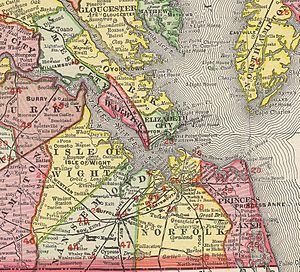Elizabeth City County, Virginia facts for kids
Elizabeth City County was an important area in southeastern Virginia for many years. It existed as a county from 1634 until 1952. In 1952, it joined with the city of Hampton. This merger helped create the modern city of Hampton, which now covers almost all of what used to be Elizabeth City County.
Contents
How Elizabeth City County Started
Elizabeth City County began in 1634 as one of the first eight areas, called "shires," created in the Virginia Colony. These shires were set up by order of King Charles I.
In 1636, the original area was divided. The part north of the Hampton Roads harbor became known as Elizabeth City Shire. Soon after, its name was changed to Elizabeth City County.
Naming the County
The county was named after Elizabeth of Bohemia. She was the daughter of King James I and the sister of Princes Henry and Charles.
Early Settlers and Native Americans
Before the English arrived, the area was called Kikotan. This was likely a name for the Native American people living there. When the English first came in 1607, the Native Americans were friendly.
However, in 1610, English settlers took over the Native American village of Kikotan. They then established their own settlement there. This area later grew into the city of Hampton.
Hampton's Role and Mergers
The town of Hampton was founded in 1680. It grew to be the largest town in Elizabeth City County and became the county's main center.
In 1908, Hampton became an independent city. This meant it had its own government, separate from the county. However, it still remained the county seat and shared many services with Elizabeth City County.
The Big Merger of 1952
In 1952, Elizabeth City County and its only incorporated town, Phoebus, officially merged with Hampton. This was a big change! It was one of the first of many mergers in the Hampton Roads area, where many smaller towns and counties joined together to form larger independent cities.
Today, the city of Hampton covers almost all the land that was once Elizabeth City County.
Changes with Newport News
Not all of Elizabeth City County became part of Hampton. Some parts of the western side of the county became part of Warwick County. This happened when the Chesapeake & Ohio Railway built its "Peninsula Extension."
Later, the city of Newport News was formed from parts of Warwick County. In 1927, the town of Kecoughtan, which was in Elizabeth City County, also became part of Newport News.
Claim to Being the Oldest City
Since English settlers moved into the former Native American village of Kecoughtan in 1610, and the town of Jamestown was no longer used after 1699, the city of Hampton now says it is the oldest continuously settled English-speaking city in North America. This means people have lived there without stopping since 1610.
Historical Population
Here's how the population of Elizabeth City County changed over the years:
| Historical population | |||
|---|---|---|---|
| Census | Pop. | %± | |
| 1790 | 3,450 | — | |
| 1800 | 2,778 | −19.5% | |
| 1810 | 3,608 | 29.9% | |
| 1820 | 3,789 | 5.0% | |
| 1830 | 5,053 | 33.4% | |
| 1840 | 3,706 | −26.7% | |
| 1850 | 4,588 | 23.8% | |
| 1860 | 5,798 | 26.4% | |
| 1870 | 8,303 | 43.2% | |
| 1880 | 10,689 | 28.7% | |
| 1890 | 16,168 | 51.3% | |
| 1900 | 19,460 | 20.4% | |
| 1910 | 15,720 | −19.2% | |
| 1920 | 19,111 | 21.6% | |
| 1930 | 19,835 | 3.8% | |
| 1940 | 32,283 | 62.8% | |
| 1950 | 55,028 | 70.5% | |
| 1790-1950 Population as Elizabeth City County | |||
Notable People
- Mary Cary Ambler (1732–1781) - She was an early American diarist. Her father, Colonel Wilson Cary, owned the Ceelys on the James plantation in Elizabeth City County, Virginia.
Major Communities in Elizabeth City County
Here are some of the main communities that were once part of Elizabeth City County:
- Buckroe Beach
- Fox Hill
- Kecoughtan
- Langley Field
- Plum Tree Point
- Phoebus
- Hampton (before it became an independent city)
- Wythe
- Aberdeen Gardens
- Pine Chapel Village
 | John T. Biggers |
 | Thomas Blackshear |
 | Mark Bradford |
 | Beverly Buchanan |


